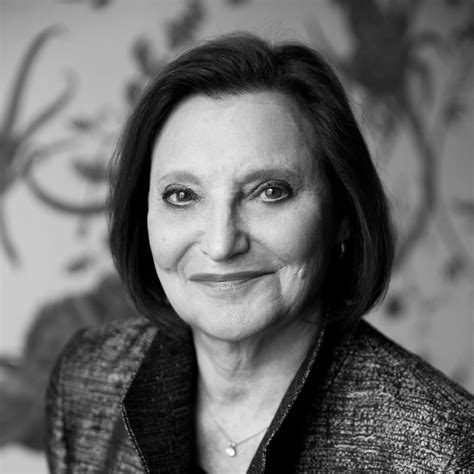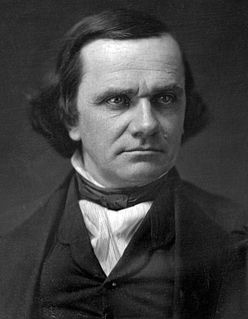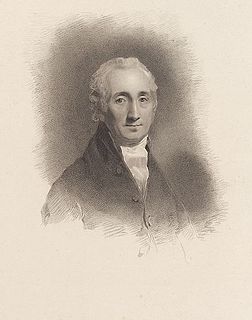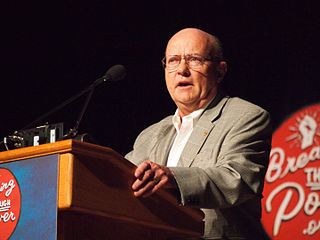Top 1200 Moral Courage Quotes & Sayings - Page 18
Explore popular Moral Courage quotes.
Last updated on April 22, 2025.
In the greatest fiction, the writer's moral sense coincides with his dramatic sense, and I see no way for it to do this unless his moral judgement is part of the very act of seeing, and he is free to use it. I have heard it said that belief in Christian dogma is a hindrance to the writer, but I myself have found nothing further from the truth. Actually, it frees the storyteller to observe. It is not a set of rules which fixes what he sees in the world. It affects his writing primarily by guaranteeing his respect for mystery.
Totalitarian regimes produce a culture and a moral code that is totally different from what happens in a democracy. There are two moral categories in a communist society: honest men and bad men. The "honest" ones resist compromising or collaborating with the regime, while the "bad" are the persecutors and collaborators. You can choose to be on one side or the other, but there is nothing in between. In a normal society, other factors can define who you are. You can be a good worker, sociable, tough, generous, tolerant, collaborative, friendly.
Environmental history was . . . born out of a moral purpose, with strong political commitments behind it, but also became, as it matured, a scholarly enterprise that had neither any simple, nor any single, moral or political agenda to promote. Its principal goal became one of deepening our understanding of how humans have been affected by their natural environment through time and, conversely, how they have affected that environment and with what results.
Professional courage is the steel fiber that makes an NCO unafraid and willing to tell it like it is. The concept of professional courage does not always mean being as tough as nails, either. It also suggests a willingness to listen to the soldiers' problems, to go to bat for them in a tough situation and it means knowing just how far they can go. It also means being willing to tell the boss when he is wrong.
Maybe the growth of "God" signifies the existence of God. That is: if history naturally pushes people toward moral improvement, toward moral growth, and their God, as they conceive their God, grows accordingly, becoming morally richer, then maybe this growth is evidence of some higher purpose, and maybe - conceivably - the source of that purpose is worthy of the name divinity.
Theologians talk about a prevenient grace that precedes grace itself and allows us to accept it. I think there must also be a prevenient courage that allows us to be brave - that is, to acknowledge that there is more beauty than our eyes can bear, that precious things have been put into our hands and to do nothing to honor them is to do great harm. And therefore, this courage allows us, as the old men said, to make ourselves useful. It allows us to be generous, which is another way of saying exactly the same thing.
In any age courage is the simple virtue needed for a human being to traverse the rocky road from infancy to maturity of personality. But in an age of anxiety, an age of herd morality and personal isolation, courage is a sine qua non. In periods when the mores of the society were more consistent guides, the individual was more firmly cushioned in his crises of development; but in times of transition like ours, the individual is thrown on his own at an earlier age and for a longer period.
The good of the governed is the end, and rewards and punishments are the means, of all government. The government of the supreme and all-perfect Mind, over all his intellectual creation, is by proportioning rewards to piety and virtue, and punishments to disobedience and vice. ... The joys of heaven are prepared, and the horrors of hell in a future state, to render the moral government of the universe perfect and complete. Human government is more or less perfect, as it approaches nearer or diverges further from an imitation of this perfect plan of divine and moral government.
We have a dangerous trend beginning to take place in our education. We're starting to put more and more textbooks into our schools. We've become accustomed of late of putting little books into the hands of children, containing fables and moral lessons. We're spending less time in the classroom on the Bible, which should be the principal text in our schools. The Bible states these great moral lessons better than any other man-made book.
Those who believe they have pleased God by the quality of their devotion and moral goodness naturally feel that they and their group deserve deference and power over others. The God of Jesus and the prophets, however, saves completely by grace. He cannot be manipulated by religious and moral performance--he can only be reached through repentance, through the giving up of power. If we are saved by sheer grace we can only become grateful, willing servants of God and of everyone around us.
I feel like we're between two great possibilities: we're either going to turn things around, and in this generation see the rising sun of a new moral dedication in America, or we're going to lose the struggle for that moral renewal, throw away the basic principles on which our life and civilization is based, and head toward a new century that will make the 20th century look like a dress rehearsal for evil.
It is rational to choose the right means to your ends to develop very elegant abstract formal theories of rational choice, and then turn these into what look like moral theories. Philosophers tend to be ravished by the formal beauty of such theories, and they don't pay much attention to the fact that our human limitations make them pretty useless in practice, while the simple point about instrumental reasoning is too shallow to be of much real moral interest.
So long as the mental and moral instruction of man is left solely in the hands of hired servants of the public--let them be teachers of religion, professors of colleges, authors of books, or editors of journals or periodical publications, dependent upon their literary incomes for their daily bread, so long shall we hear but half the truth; and well if we hear so much. Our teachers, political, scientific, moral, or religious; our writers, grave or gay, are compelled to administer to our prejudices and to perpetuate our ignorance.
As long as we are on firm moral ground, as long as we're caring about other people, these are legitimate worries. The minute that we start protecting our own interests in the name of these worries and saying, "Oh, we have to make sure that only Ford Motor Company manufactures cars, because we can't be sure that the cars in other countries are being made quite up to our point of view," we're economically off base, and, of course, we're moral hypocrites, too.
There is a form of poetic and esthetic and moral genius necessary to make philosophical issues truly incandesce for students, and even though I indeed had some world-class professors myself when I went through the curriculum, I rarely saw such gnosic or concretist/poetic passion among them. I am not speaking of broad histrionics or melodramatic delivery, but rather a moral investment of concern, of loving delight and pathos in exposing one's consciousness to the full horrific and magnificent implications of the materials.
It is an assumption that there is always one single dimension for assessing persons and their actions that has canonical priority. This is the dimension of moral evaluation; "good/evil" is supposed always to trump any other form of evaluation, but that is an assumption, probably the result of the long history of the Christianisation and then gradual de-Christianisation of Europe, which one need not make. Evaluation need not mean moral evaluation, but might include assessments of efficiency, ... simplicity, perspicuousness, aesthetic appeal, and so on.
To speak of ‘limits to growth’ under a capitalistic market economy is as meaningless as to speak of limits of warfare under a warrior society. The moral pieties, that are voiced today by many well-meaning environmentalists, are as naive as the moral pieties of multinationals are manipulative. Capitalism can no more be ‘persuaded’ to limit growth than a human being can be ‘persuaded’ to stop breathing. Attempts to ‘green’ capitalism, to make it ‘ecological’, are doomed by the very nature of the system as a system of endless growth.
It was necessary to put the South at a moral disadvantage by transforming the contest from a war waged against states fighting for their indepdence into a war waged against states fighting for the maintenance and extension of slavery...and the world, it might be hoped, would see it as a moral war, not a political; and the sympathy of nations would begin to run for the North, not for the South.
Conservatives say the government can't end poverty by force, but they believe it can use force to make people moral. Liberals say government can't make people be moral, but they believe it can end poverty. Neither group attempts to explain why government is so clumsy and destructive in one area but a paragon of efficiency and benevolence in the other.
The Art of Success . . . Success is ninety-nine percent mental attitude. It calls for love, joy, optimism, confidence, serenity, poise, faith, courage, cheerfulness, imagination, initiative, tolerance, honesty, humility, patience, and enthusiasm. . . . Success is having the courage to meet failure without being defeated. It is refusing to let present loss interfere with your long-range goal. . . . Success is relative and individual and personal. It is your answer to the problem of making your minutes, hours, days, weeks, months, and years add up to a great life.
When a thought oppresses you, do not be downhearted, but put up with it in courage, saying, 'They swarmed around me closer and closer, but I drove them back in the name of the Lord' (Ps. 118:11). Divine help will arrive at your side immediately, and you will drive them away from you, and courage will compass you round about, and the glory of God will walk with you; and 'you will be filled to your soul's desire' (Isa. 58:11).
Of all the things about de Sade, I would argue he is funny. A lot of people didn't understand de Sade. No. 1, he is a very good writer, and No. 2, he had the courage to talk about a lot of things that in public, even now, almost nobody has the courage to talk about. He would do it with a kind of funny way - not the stories themselves, but the way he tells them. He is never serious.
If there is no struggle, there is no progress. Those who profess to favor freedom, and yet depreciate agitation, are men who want crops without plowing up the ground. They want rain without thunder and lightning. They want the ocean without the awful roar of its many waters. This struggle may be a moral one; or it may be a physical one; or it may be both moral and physical; but it must be a struggle.
For nearly a century, the moral relativism of science has given faith-based religion--that great engine of ignorance and bigotry--a nearly uncontested claim to being the only universal framework for moral wisdom. As a result, the most powerful societies on early spend their time debating issues like gay marriage when they should be focused on problems like nuclear proliferation, genocide, energy security, climate change, poverty, and failing schools.
We do literature a real disservice if we reduce it to knowledge or to use, to a problem to be solved. If literature solves problems, it does so by its own inexhaustibility, and by its ultimate refusal to be applied or used, even for moral good. This refusal, indeed, is literature's most moral act. At a time when meanings are manifold, disparate, and always changing, the rich possibility of interpretation--the happy resistance of the text to ever be fully known and mastered--is one of the most exhilarating products of human culture.
I am now speaking of rights under the Constitution, and not of moral or religious rights. I do not discuss the morals of the people of Missouri, but let them settle that matter for themselves. I hold that the people of the slaveholding States are civilized men as well as ourselves, that they bear consciences as well as we, and that they are accountable to God and their posterity and not to us. It is for them to decide therefore the moral and religious right of the slavery question for themselves within their own limits.
You do just have to go back to moral philosophy and you've got to say, okay, there is greed, people do want more and more, but then what restrains them and what restrained them in the past was a view of life in which one's satisfaction wasn't the most important thing, that you just, you needed enough and you could say, "Enough is enough." Maybe religion will get you there, maybe just classic moral philosophy, but you have to have some of that, or else you're always on the gravy train.
We need enthusiasm, imagination and the ability to face facts, even unpleasant ones, bravely. We need to correct, by drastic means if necessary, the faults in our economic system from which we now suffer. We need the courage of the young. Yours is not the task of making your way in the world, but the task of remaking the world which you will find before you. May every one of us be granted the courage, the faith and the vision to give the best that is in us to that remaking!
Go through the moral demands...one by one and you will find that man could not live up to them; the intention is not that he should become more moral, but that he should feel as sinful as possible. If man had failed to find this feeling pleasant - why should he have engendered such an idea and adhered to it for so long?... Man was by every means to be made sinful and thereby become excited, animated, enlivened in general. To excite, animate, enliven at any price.
... when you make it a moral necessity for the young to dabble in all the subjects that the books on the top shelf are written about, you kill two very large birds with one stone: you satisfy precious curiosities, and you make them believe that they know as much about life as people who really know something. If college boys are solemnly advised to listen to lectures on prostitution, they will listen; and who is to blame if some time, in a less moral moment, they profit by their information?
To gain your heart's desire you have to lose some part of your old life, your old self. To do that you have to have courage; without it, you can't make the leap. And if you don't make the leap you have only three choices: You can hate yourself for not taking the chance, you can hate the person from whom you've sacrificed your happiness, or you can hate the one who offered you happiness, and blame them for your lack of courage, convince yourself it wasn't real.
The Christian faith, simply stated, reminds us that our fundamental problem is not moral; rather, our fundamental problem is spiritual. It is not just that we are immoral, but that a moral life alone cannot bridge what separates us from God. Herein lies the cardinal difference between the moralizing religions and Jesus' offer to us. Jesus does not offer to make bad people good but to make dead people alive.
Art itself is essentially ethical; because every true work of art must have a beauty or grandeur of some kind, and beauty and grandeur cannot be comprehended by the beholder except through the moral sentiment. The eye is only a witness; it is not a judge. The mind judges what the eye reports to it; therefore, whatever elevates the moral sentiment to the contemplation of beauty and grandeur is in itself ethical.
The average age of the world's great civilizations has been two hundred years. These nations have progressed through the following sequence: from bondage to spiritual faith, from spiritual faith to great courage, from courage to liberty, from liberty to abundance, from abundance to selfishness, from selfishness to complacency from complacency to apathy, from apathy to dependency, from dependency back to bondage.
This is another thing which I really like investigating in my novels: what is it that makes an intimate society, that makes a society in which moral concern for others will be possible? Part of that I think are manners and ritual. We tried to get rid of manners, we tried to abolish manners in the '60s. Manners were very, very old-fashioned and un-cool. And of course we didn't realise that manners are the building blocks of proper moral relationships between people.
People who thought of my journey as a physical ordeal or an act of courage... missed the point. Courage and physical endurance were no more than useful items of equipment for me, like facility with languages or immunity to hepatitis. The goal was comprehension, and the only way to comprehend the world was by making myself vulnerable to it so that it could change me. The challenge was to lay myself open to everybody and everything that came my way. The prize was to change and grow big enough to feel one with the whole world.
A crucial turning point in that earlier history occurred when men and women of good will turned aside from the task of shoring up the Roman imperium and ceased to identify the continuation of civility and moral community with the maintenance of that imperium. What they set themselves out to achieve instead - often not recognizing fully what they were doing - was the construction of new forms of community within which the moral life could be sustained so that both morality and civility might survive the coming age of barbarism and darkness.
The American people are not ready for the idea that everyone has at least a moral right to good, timely health care. They do agree they have a moral right, in critical cases, to have anything done to save their life, but they don't believe that anyone has a right not to fall that sick to begin with. So if you ask me, "Are we ever succumbing to some notions of solidarity as a nation?," I would say, "Not at all." I would describe us as a group of people who share a geography. That's a better description of Americans than that we're a real nation with a sense of solidarity.
Don't wait until you die to learn the warrior's way. Do it now, each night, just before you drift off to sleep. As you review your day, consider these two questions of courage and love. Learn from each day, so that each day you can show a little more courage and a little more love. Then, as incidents occur, you may rise to the occasion and look back at the end of your life and feel good about the way you lived.
The insistence on truthfulness does not disturb the freedom of the individual. The social obligation implied in Satyagraha turns the freedom of the individual into moral freedom. An atheist is free to say or to do what he likes, provided he does what he says and says what he does. So, in the context of social relations, the freedom of the individual is moral freedom.
Since my moral system rests on my accepted version of the facts, he who denies my moral judgments or my version of the facts, is to me perverse, alien, dangerous. How shall I account for him? The opponent has always to be explained, and the last explanation that we ever look for is that he sees a different set of facts. Such an explanation we avoid, because it saps the very foundation of our own assurance that we have seen life steadily and seen it whole.
Man, no doubt, owes many other moral duties to his fellow men; such as to feed the hungry, clothe the naked, shelter the homeless, care for the sick, protect the defenseless, assist the weak, and enlighten the ignorant. But these are simply moral duties, of which each man must be his own judge, in each particular case, as to whether, and how, and how far, he can, or will perform them.
It is only your self-identification with your mind that makes you happy or unhappy. Rebel against your slavery to your mind, see your bonds as self-created and break the chains of attachment and revulsion. Keep in mind your goal of freedom, until it dawns on you that you are already free, that freedom is not something in the distant future to be earned with painful efforts, but perennially one's own, to be used! Liberation is not an acquisition but a matter of courage, the courage to believe that you are free already and to act on it.
To be beneficent when we can is a duty; and besides this, there are many minds so sympathetically constituted that, without any other motive of vanity or self-interest, they find a pleasure in spreading joy around them, and can take delight in the satisfaction of others so far as it is their own work. But I maintain that in such a case an action of this kind, however proper, however amiable it may be, has nevertheless no true moral worth, but is on a level with other inclinations. . . . For the maxim lacks the moral import, namely, that such actions be done from duty, not from inclination.
There could never be enough rules so finely crafted as to anticipate and cover every situation, and even if there were, enforcement would be impossibly expensive and burdensome. This approach leads to diminished freedom for everyone...In the end, it is only an internal moral compass in each individual that can effectively deal with the root causes as well as the symptoms of societal decay. Societies will struggle in vain to establish the common good until sin is denounced as sin and moral discipline takes its place in the pantheon of civic virtues.
What after all, has maintained the human race on this old globe despite all the calamities of nature and all the tragic failings of mankind, if not faith in new possibilities, and courage to advocate them. Doubtless many times these new possibilities were declared by a man who, quite unconscious of courage, bore the "sense of being an exile, a condemned criminal, a fugitive from mankind." Did every one so feel who, in order to travel on his own proper path had been obliged to leave the traditional highway?
It is quite useless to declare that all men are born free if you deny that they are born good . Guarantee a man's goodness and his liberty will take care of itself. To guarantee his freedom on condition that you approve of his moral character is formally to abolish all freedom whatsoever, as every man's liberty is at the mercy of a moral indictment which any fool can trump up against everyone who violates custom, whether as a prophet or as a rascal.
Edward Snowden is anything but narcissist. In fact, I wonder every day how he could come up with the courage, muster the courage to sacrifice everything just so he could do, as he said in rather eloquent speech initially, alert the American people to what was going on. Call him a traitor, call him whatever you want to. The fact is he is a symptom of the disease, and the disease is constant war and the national security state. That is what we've become. That is our raison d'être in the world today, to wage war.
Talking Taboo is a groundbreaking book. This chorus of bold female voices is presenting the church with an opportunity to engage real but all too frequently avoided or unseen issues impacting countless Christian women today. Their candid essays cover a wide spectrum of perspectives. Readers will resonate with some and be shocked by others. Talking Taboo took courage to write. Reading taboo takes courage too. So buckle up and brace yourself for an eye-opening but vitally important read!
Courage is the most important thing...Wake up yourselves and others. Control your mind and have firm determination... Be firm like a rock, deep and serious like the sea. Think of the earth as a mother. Have great courage and patience - and be not afraid of water, fire or great storms - face them bravely. Face the fire and it will turn to ice. This requires control of mind and a firm determination.
When we assume God to be a guiding principle well, sure enough, a god is usually characteristic of a certain system of thought or morality. For instance, take the Christian God, the summum bonum: God is love, love being the highest moral principle; and God is spirit, the spirit being the supreme idea of meaning. All our Christian moral concepts derive from such assumptions, and the supreme essence of all of them is what we call God.
... For all our alarm, it is clear that the religious right is responding to a real hunger in our society... a deep-seated yearning for stable values... When conservative Christian groups talk of failures in our educational system, the erosion of our moral standards, and the waste of young lives, they are addressing real and legitimate concerns... Among secularists, the aversion toward discussion of moral values, let alone religion, can reach absurd extremes.
The second noble truth states that we must discover why we are suffering. We must cultivate the courage to look deeply, with clarity and courage, into our own suffering. We often hold the tacit assumption that all of our suffering stems from events in the past. But, whatever the initial seed of trauma, the deeper truth is that our suffering is more closely a result of how we deal with the effect these past events have on us in the present.
If there is no absolute moral standard, then one cannot say in a final sense that anything is right or wrong. By absolute we mean that which always applies, that which provides a final or ultimate standard. There must be an absolute if there are to be morals, and there must be an absolute if there are to be real values. If there is no absolute beyond man's ideas, then there is no final appeal to judge between individuals and groups whose moral judgments conflict. We are merely left with conflicting opinions.
What sets Christian spiritual activity apart from all other religions is that they have knowledge of Christ as their goal; not moral perfection (although you will become more moral), not tranquility (although your life will be remarkably more peaceful). And because of the grace you have in Christ, the disciplines will do nothing to make you more accepted by the Father. You cannot be more accepted than you already are in Christ, since He has already done it all for you!
We are on strike against martyrdom—and against the moral code that demands it. We are on strike against those who believe that one man must exist for the sake of another. We are on strike against the morality of cannibals, be it practiced in body or in spirit. We will not deal with men on any terms but ours—and our terms are a moral code which holds that man is an end in himself and not the means to any end of others.


























































